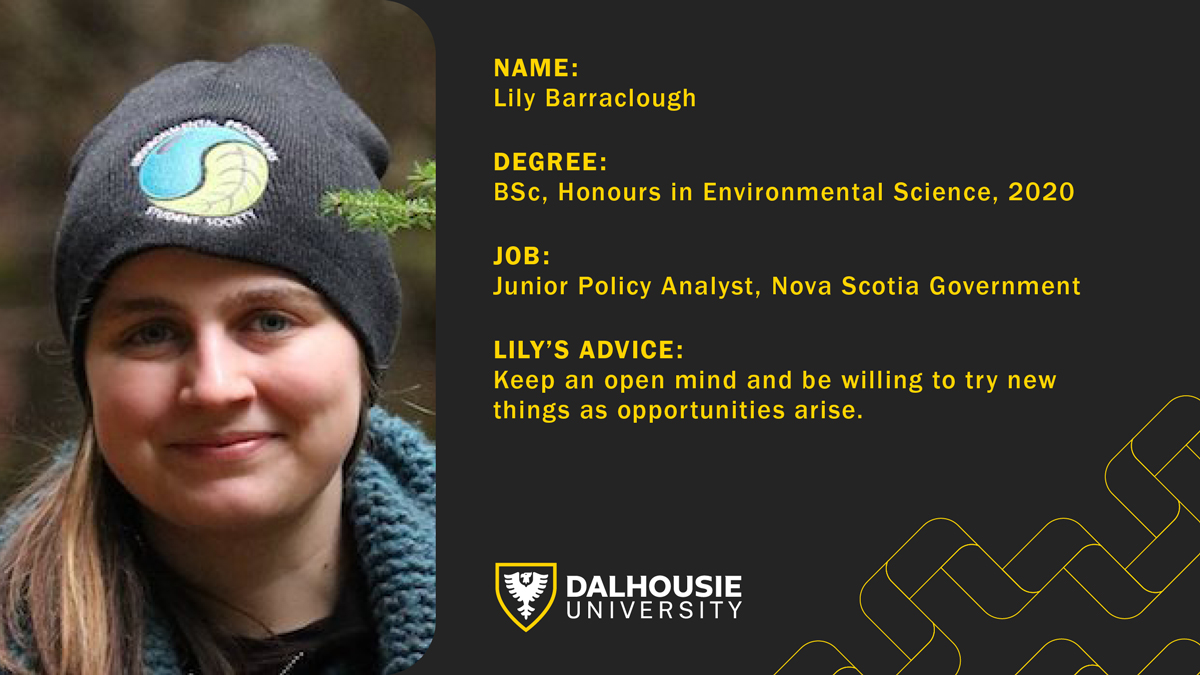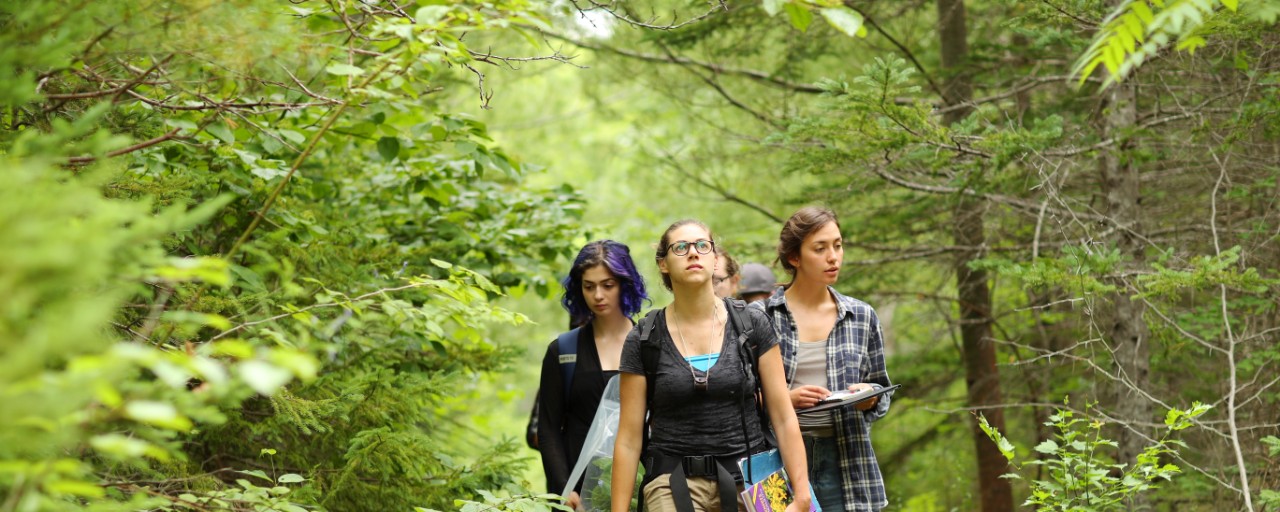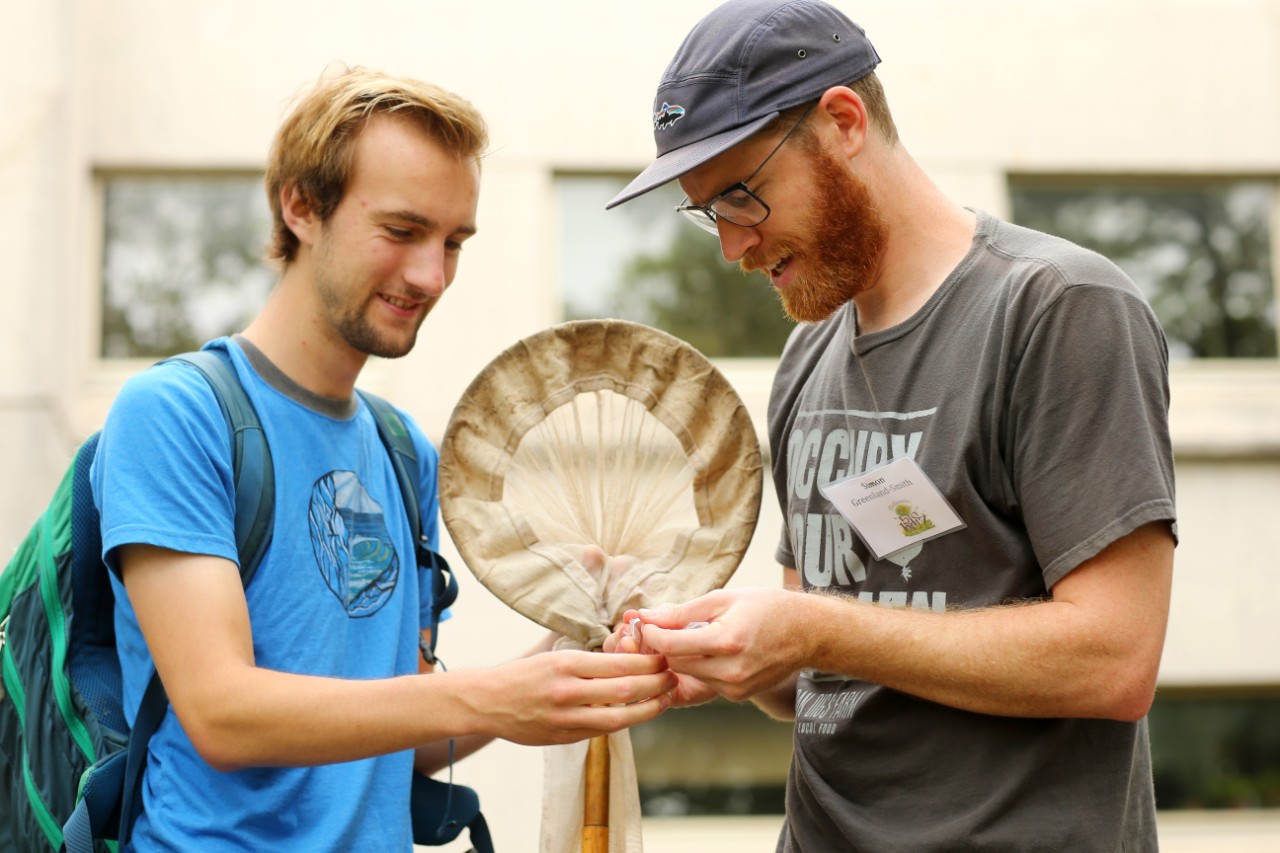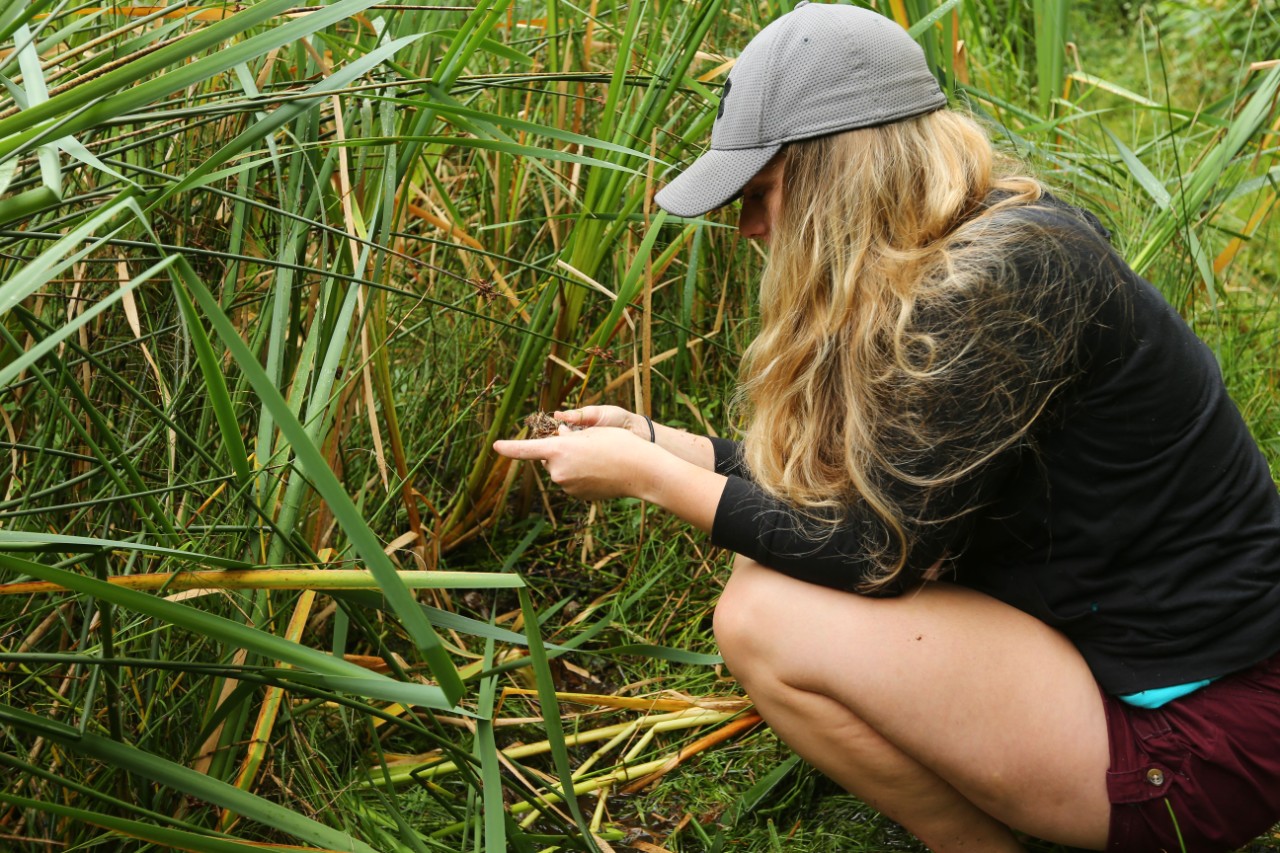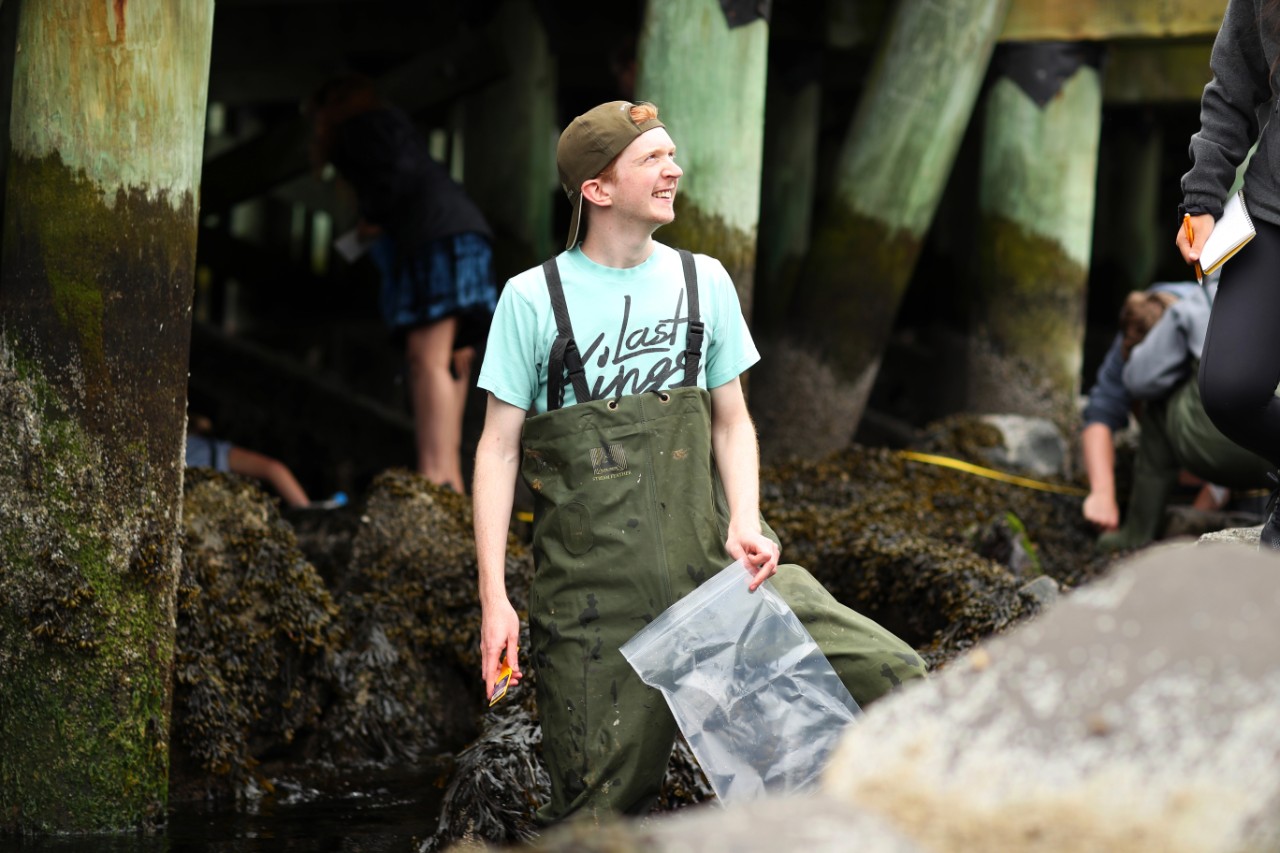Environmental Science
The Department of Earth and Environmental Sciences at Dalhousie University offers Majors in both Environmental Science and Earth Science. Complete your undergraduate degree as a major, or consider completing an honours or co-op degree and/or earning one or more certificates if certain courses are taken as part of the program.
Your Major Map: Environmental Science
The Environmental Science Major Map highlights academic and co-curricular opportunities and provides an overview of how students can customize their degree. Students are encouraged to connect with advising supports at Dalhousie and use the Academic Calendar and Timetable to create their course plan.
< 30 CREDIT HOURS/FIRST YEAR
- Complete required introductory courses in environmental science: ENVS 1100/1200 and in other subjects. See the first-year course planner worksheet for more information
- At the end of your first year, you can declare your major and register for second-year courses
30-60 CREDIT HOURS/SECOND YEAR
- You will start taking more core courses* in ENVS and relevant disciplines, gaining knowledge and lab experience: ENVS 2000, ENVS 2100, ENVS 2500, PHIL 2480, PHYC 2310, BIOL 2060, STAT 2080, ECON 1101/1102
- Consider combining your degree with another subject with a double major, minor, or certificate
- Consider taking summer field courses through the SEASIDE program or courses abroad, or applying for an internship
60-90 CREDIT HOURS/THIRD YEAR+
- There are 7 core ENVS courses* that can be taken over your third and final year. Make sure you're on track with course requirements using DARS
- Looking for a hands-on learning experience? there are many experiential learning and directed research courses offered by the department
- Apply for an honours degree ahead of your fourth year if you are considering graduate studies
90-120 CREDIT HOURS/FINAL YEAR
- Make sure you have completed all core ENVS courses and complete any remaining requirements for a certificate or minor and check your degree audit to ensure you are on track to graduate
- Apply to graduate by Dec 1 for spring convocation and July 2 for fall convocation
*Note that not all courses are offered each semester or year and that course requirements may vary according to your degree type (major, double major, minor, honours). Be sure to keep track of these by consulting the academic calendar.
*After declaring your major, we strongly encourage you to connect with program advisors for course planning and any other questions related to your program.
< 30 CREDIT HOURS/FIRST YEAR
- Build connections by enrolling in a first-year interest group (FIGS) like Oceans, Climate Change, Earth and Environment, and Indigenous Ways of Knowing
- Sign up to be mentored by an upper-year student
30-60 CREDIT HOURS/SECOND YEAR
- Explore the myCareer portal to browse through work and volunteer opportunities on and off campus
- Combine academic study and paid career-related work experience by enrolling in co-op
- Consider applying for the Sustainability Leadership Internship in the Bahamas, scholarships available on a competitive basis
60-90 CREDIT HOURS/THIRD YEAR+
- There are 70 Faculty-coordinated summer research awards available each year that you can apply for on a competitive basis
- Other opportunities include science communication internships, science innovation and entrepreneurship through SURGE, and student society leadership roles
90-120 CREDIT HOURS/FINAL YEAR
|
< 30 CREDIT HOURS/FIRST YEAR
- Attend the Dal Science Welcome Party
- Attend the Faculty of Science Program Fair for help planning your next steps
- Consider joining EPSS – Environmental Programs Student Society! Meet other like-minded students and participate in fun events
30-60 CREDIT HOURS/SECOND YEAR
- Reach out to the Department's many world-class researchers and faculty to join a research lab as a volunteer
60-90 CREDIT HOURS/THIRD YEAR+
- Consider running for a position with the Dal Science Society's Executive or with your student society
90-120 CREDIT HOURS/FINAL YEAR
|
< 30 CREDIT HOURS/FIRST YEAR
|
30-60 CREDIT HOURS/SECOND YEAR
- Explore career paths and industries that spark your interest by attending an alumni panel discussion
60-90 CREDIT HOURS/THIRD YEAR+
- See which scholarships & prizes might be available to you through the department, on a competitive basis
90-120 CREDIT HOURS/FINAL YEAR
- Time to celebrate your achievements and graduate!
- Connect with the Bissett Student Success Success Centre career supports to get prepared for interviews, and more as your prepare to head out on the job hunt or to apply for graduate school
For any questions about your major, enrolling in a minor or certificate, summer research, or honours, speak with a program advisor!
Where your degree can take you
A BSc degree in Environmental Science provides great preparation for a variety of careers. The skills and knowledge acquired through this program can be applied, but are not limited to career paths in:
Conservation, sustainable development, research, government and regulatory affairs, business, economics, engineering, environmental law, environmental consulting, education, science communication, business, non-profit organizations, and journalism, among many more.
Core competencies gained
Discipline-level skills:
- An understanding of earth processes, and the relationships between water, air soil, and ecosystems
- Knowledge of the impact of climate change, agriculture, forestry, and oil and gas exploration on the environment
- Use of water, soil, climate monitoring equipment and geographic information systems to study environments
- Applying an interdisciplinary approach to study and provide solutions to some of the major environmental issues facing human societies
Transferable skills:
- Academic writing and presentation skills
- Critical thinking, synthesis, and analytical skills
- Communication skills
- Numeracy skills
- Time/project management
- Leadership and teamwork
- Statistical analyses
- Research/fieldwork skills
Possible careers and employment
Environmental science Alumni can be employed within a variety of sectors and have multiple career path options. These are influenced by the student's elective courses, experiential learning choices, and certificates. Some of the options below will typically require additional or graduate-level training*, while some can be pursued following the completion of baccalaureate program only.
- Agricultural Scientist*
- Conservation Biologist*
- Environmental Consultant
- Eco-tourism Specialist
- Environmental Analyst
- Environmental Manager*
- Environmental Scientist*
- Environmental Health Officer
- Environmental Engineer*
- Environmental Technician
- Environmental Lawyer*
- Journalist
- Laboratory Technician
- Nature Conservation Officer
- Natural Resource Manager
- Nature Educator
- Policy Analyst
- Restoration Ecologist*
- Recycling Officer
- Teacher/Professor*
- Zoologist*
